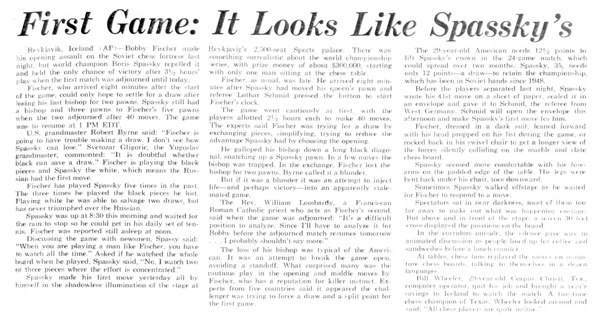Newsday (Nassau Edition) Hempstead, New York Wednesday, July 12, 1972 - Page 85
First Game: It Looks Like Spassky's
Reykjavik, Iceland (AP)—Bobby Fischer made his opening assault on the Soviet chess fortress last night, but world champion Boris Spassky repelled it and held the only chance of victory after 3½ hours' play when the first match was adjourned until today.
Fischer, who arrived eight minutes after the start of the game, could only hope to settle for a draw after losing his last bishop for two pawns. Spassky still had a bishop and three pawns to Fischer's five pawns when the two adjourned after 40 moves. The game was to resume at 1 p.m. EDT.
U.S. grandmaster Robert Byrne said: “Fischer is going to have trouble making a draw. I don't see how Spassky can lose.” Svetozar Gligoric, the Yugoslav grandmaster, commented: “It is doubtful whether black can save a draw.” Fischer is playing the black pieces and Spassky the white, which means the Russian had the first move.
Fischer has played Spassky five times in the past. The three times he played the black pieces he lost. Playing white he was able to salvage two draws, but has never triumphed over the Russian.
Spassky was up at 8:30 this morning and waited for the rain to stop so he could get in his daily set of tennis. Fischer was reported still asleep at noon.
Discussing the game with newsmen, Spassky said: “When you are playing a man like Fischer, you have to watch all the time.” Asked if he watched the whole board when he played, Spassky said “No, I watch two or three pieces where the effort is concentrated.”
Spassky made his first move yesterday all by himself in the shadowless illumination of the stage at Reykjavik's 2,500-seat Sports palace. There was something surrealistic about the world championship series, with prize money of about $300,000, starting with only one man sitting at the chess table.
Fischer was late. He arrived eight minutes after Spassky ([due to being held up in traffic but the reporter didn't seem to feel that actual facts were important to pass along to American readers. And, if the Icelandic police had been available to properly clear traffic as is customary with so-called “police protection” Fischer would have arrived on time, as police are supposed to know, in advance about fluctuations in traffic congestion]) had moved his queen's pawn and referee Lothar Schmid pressed the button to start Fischer's clock.
The game went cautiously at first, with the players allotted 2½ hours each to make 40 moves. The experts said Fischer was trying for a draw by exchanging pieces, simplifying, trying to reduce the advantage Spassky had by choosing the opening.
He galloped his bishop down a long black diagonal, snatching up a Spassky pawn. In a few moves the bishop was trapped. In the exchange, Fischer lost the bishop for two pawns. Byrne called it a blunder.
But if it was a blunder it was an attempt to inject life—and perhaps victory—into an apparently stalemated game.
The Rev. William Lombardy, a Franciscan Roman Catholic priest who acts as Fischer's second, said when the game was adjourned: “It's a difficult position to analyze. Since I'll have to analyze it for Bobby before the adjourned match resumes tomorrow … I probably shouldn't say more.”
The loss of his bishop was typical of the American. It was an attempt to break the game open, avoiding a standoff. What surprised many was the cautious play in the opening and middle moves by Fischer, who has a reputation for killer instinct. Experts from five countries said it appeared the challenger was trying to force a draw and a split point for the first game.
The 29-year-old American needs 12½ points to lift Spassky's crown in the 24-game match, which could spread over two months. Spassky, 35, needs only 12 points—a draw—to retain the championship, which has been in Soviet hands since 1948.
Before the players separated last night, Spassky wrote his 41st move on a sheet of paper, sealed it in an envelope and gave it to Schmid, the referee from West Germany, Schmid will open the envelope this afternoon and make Spassky's first move for him.
Fischer, dressed in a dark suit, leaned forward with his head propped on his fist during the game, or rocked back in his swivel chair to get a longer view of the forces silently colliding on the marble and slate chess board.
Spassky seemed more comfortable with his forearms on the padded edge of the table. His legs were bent back under his chair, toes downward.
Sometimes Spassky walked offstage as he waited for Fischer to respond to a move.
Spectators sat in near darkness, most of them too far away to make out what was happening onstage. But above and in front of the stage, a screen 30 feet cross displayed the positions on the board.
In the corridors outside, the silence gave way to animated discussion as people lined up for coffee and sandwiches before a lunch counter.
At tables, chess fans replayed the moves on miniature chess boards, talking to themselves in a dozen languages.
Bill Wheeler, 29-year-old Corpus Christi, Tex., computer operator, quit his job and brought a year's savings to Iceland to watch the match. A two-time chess champion of Texas, Wheeler looked around and said: “All chess players are quite insane.” ([Of course, that was a mere projection of Wheeler's own intrapersonal introspection.])
 First Game: It Looks Like Spassky's 12 Jul 1972, Wed Newsday (Nassau Edition) (Hempstead, New York) Newspapers.com
First Game: It Looks Like Spassky's 12 Jul 1972, Wed Newsday (Nassau Edition) (Hempstead, New York) Newspapers.com
























